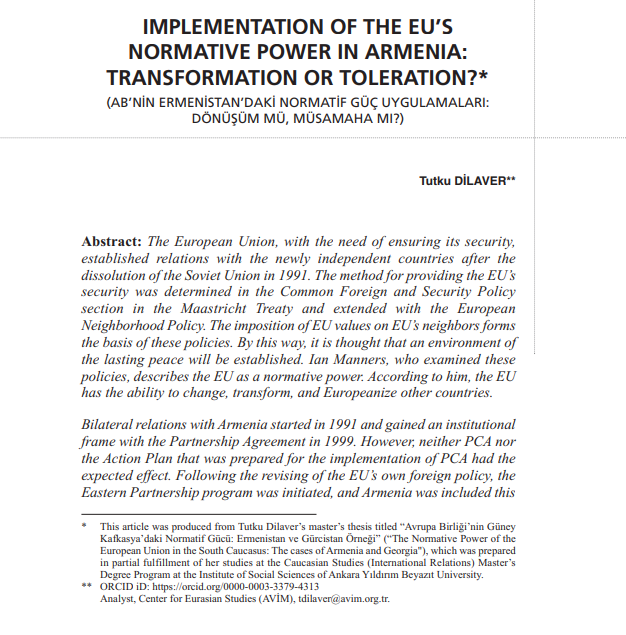
Date of Publication: 7 December 2020
Author: Tutku Dilaver
The European Union, with the need of ensuring its security, established relations with the newly independent countries after the dissolution of the Soviet Union in 1991. The method for providing the EU’s security was determined in the Common Foreign and Security Policy section in the Maastricht Treaty and extended with the European Neighborhood Policy. The imposition of EU values on EU’s neighbors forms the basis of these policies. By this way, it is thought that an environment of lasting peace will be established. Ian Manners, who examined these policies, describes the EU as a normative power. According to him, the EU has the ability to change, transform, and Europeanize other countries.
Bilateral relations with Armenia started in 1991 and gained an institutional frame with the Partnership Agreement in 1999. However, neither PCA nor the Action Plan that was prepared for the implementation of PCA had the expected effect. Following the revising of the EU’s own foreign policy, the Eastern Partnership program was initiated, and Armenia was included this program. In 2017, the Comprehensive and Enhanced Partnership Agreement was signed. With this Agreement, the EU got a chance to act as a normative power in Armenia. The purpose of this article is to evaluate the effectiveness of the EU as a normative power in Armenia. For this purpose, the 1999 Association Agreement, the Action Plan, the Country Progress Reports, the Comprehensive and Enhanced Partnership Agreement and finally the implementation reports of this agreement will be examined.
No comments yet.
-
25.01.2016
THE ARMENIAN QUESTION - BASIC KNOWLEDGE AND DOCUMENTATION -
12.06.2024
THE TRUTH WILL OUT -
27.03.2023
RADİKAL ERMENİ UNSURLARCA GERÇEKLEŞTİRİLEN MEZALİMLER VE VANDALİZM -
17.03.2023
PATRIOTISM PERVERTED -
23.02.2023
MEN ARE LIKE THAT -
03.02.2023
BAKÜ-TİFLİS-CEYHAN BORU HATTININ YAŞANAN TARİHİ -
16.12.2022
INTERNATIONAL SCHOLARS ON THE EVENTS OF 1915 -
07.12.2022
FAKE PHOTOS AND THE ARMENIAN PROPAGANDA -
07.12.2022
ERMENİ PROPAGANDASI VE SAHTE RESİMLER -
01.01.2022
A Letter From Japan - Strategically Mum: The Silence of the Armenians -
01.01.2022
Japonya'dan Bir Mektup - Stratejik Suskunluk: Ermenilerin Sessizliği -
03.06.2020
Anastas Mikoyan: Confessions of an Armenian Bolshevik -
08.04.2020
Sovyet Sonrası Ukrayna’da Devlet, Toplum ve Siyaset - Değişen Dinamikler, Dönüşen Kimlikler -
12.06.2018
Ermeni Sorunuyla İlgili İngiliz Belgeleri (1912-1923) - British Documents on Armenian Question (1912-1923) -
02.12.2016
Turkish-Russian Academics: A Historical Study on the Caucasus -
01.07.2016
Gürcistan'daki Müslüman Topluluklar: Azınlık Hakları, Kimlik, Siyaset -
10.03.2016
Armenian Diaspora: Diaspora, State and the Imagination of the Republic of Armenia -
24.01.2016
ERMENİ SORUNU - TEMEL BİLGİ VE BELGELER (2. BASKI)
-
AVİM Conference Hall 24.01.2023
CONFERENCE TITLED “HUNGARY’S PERSPECTIVES ON THE TURKIC WORLD"









